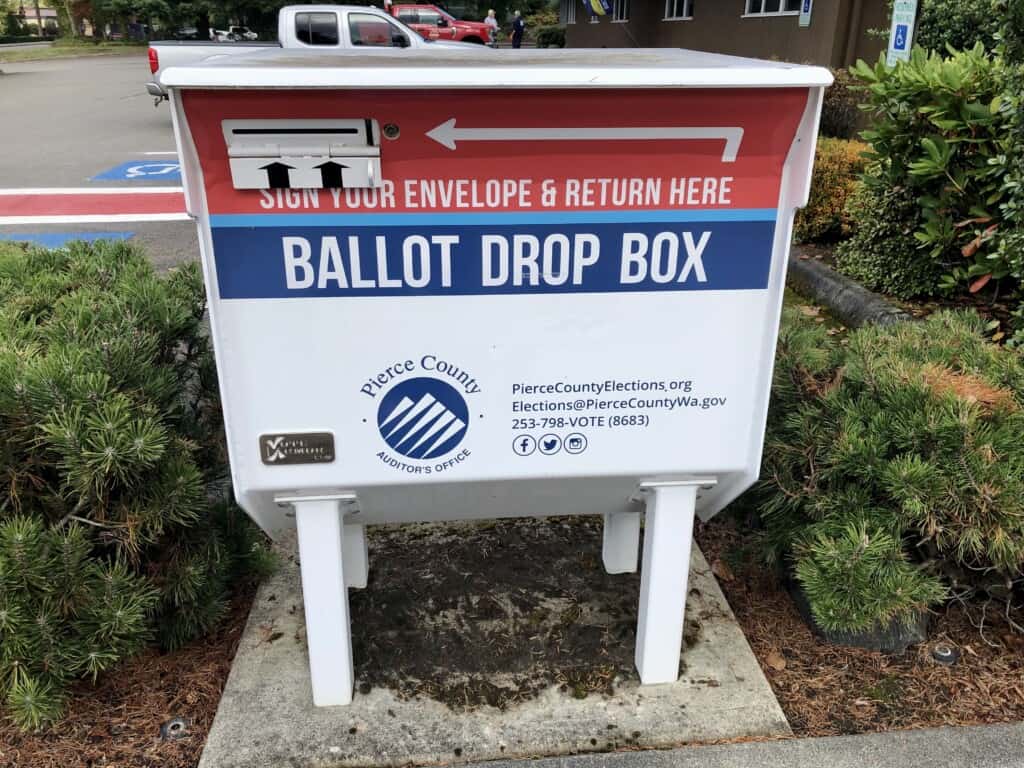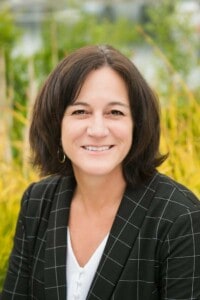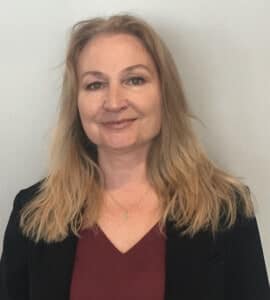Education
Butler, Ader competing for Peninsula School Board District 2 post
Two political newcomers are making a bid for the Peninsula School District Board of Directors’ District 2 position in the Nov. 2 general election. Incumbent Deborah Krishnadasan is not running for re-election.
Education Sponsor
Education stories are made possible in part by Tacoma Community College, a proud sponsor of Gig Harbor Now.
Jennifer Butler, an architect, faces Linda Ader, a former environmental consultant. Butler took 54.27% of votes in the Aug. 3 primary election. Ader had 17.89%.

Ballots can be dropped at boxes around the city. This one is at the fire station on Kimball Drive. Ed Friedrich / Gig Harbor Now
Two other candidates, Erik Johnson and David Weinberg, with Ader ran an ad before the primary in Key Peninsula News expressing opposition to “critical race theory” and “comprehensive sex education.” Johnson received 15.65% of primary votes; Weinberg received 11.95%.
The District 2 seat is one of two vacancies on the five-person Peninsula school board that will be decided in the general election. The District 5 position is also on the ballot.
The candidates’ information and responses to questions from Gig Harbor Now appear in the order candidates are listed in the Pierce County voters pamphlet. Campaign funding information is from the Washington State Public Disclosure Commission.
Jennifer Butler
Age: 44
Current occupation: Professional architect, licensed in Washington State
Have you previously run for or held elected office? No
Campaign Funds Raised/ Spent: $27,238/$17,213
1. What is your motivation to run for the Peninsula school board?
I am running for school board because I am deeply committed to education and want to elevate the Peninsula School District to be one of the top-performing in the state.
More than ever, we need board directors who listen, find common ground and seek balanced solutions. We do not need partisans fighting national political battles at our children’s expense. It will take a dedicated team effort to recover from Covid impacts, with families, teachers, administrators and the board working together.
I was proud to be a major force in bringing four new elementary schools to our Gig Harbor and Key Peninsula communities while serving as chair of Stand Up for Peninsula Schools. I have two children in the district and have been an active volunteer in the classroom and our community for years. As a former Naval officer, I understand the importance of positive leadership and clear, timely communication. As a professional architect, I bring expertise in planning and budgeting to protect our taxpayer investments. Our Gig Harbor and Key Peninsula communities deserve a school board director who is focused on our local issues and puts the needs of students first.
2. What are the top three challenges facing Peninsula School District, and what is the school board’s role in addressing them?
1. Recover from Covid impacts and close learning gaps. The effects of school closures on the academic and emotional wellbeing of our students are just beginning to be understood. Successful recovery requires both a short-term response and a long-term plan. Limit the number of missed instructional days by continuing to implement programs like “Test to Stay” that keep kids in the classroom while ensuring safety and compliance with health department guidelines. We need a robust strategic plan for assessing and responding to individual student needs, and make it easier for children to receive Individualized Education Program (IEPs). This will only happen with open lines of communication between parents, educators and staff, to ensure no child falls through the cracks.
2. Expand hands-on learning and help connect students with real-world opportunities. According to PSD statistics, 70% of seniors intend to go to college or an accredited training program, yet only 50% actually complete a 2- or 4-year degree. Meanwhile, the Career and Technical Education (CTE) Skilled Trades program allows students to earn graduation credits and industry certifications and increase job prospects right out of high school. We should expand on this, to include fields like aviation that have a strong local presence and diverse range of fields of study. Start making these real-world connections in younger grades, so middle school robotics labs and elementary Maker Space projects are aligned to build meaningful skills.
3. Ensure fiscal stability. I will draw from my professional background in architecture to ensure our ongoing capital project schedules are maintained and a robust maintenance plan is in place to protect taxpayer investments. Enrollment has decreased as a result of the pandemic, and until we fully recover, there will be budget impacts. I will work closely with the community and district to understand the priorities of parents and taxpayers and ensure dollars are spent on kids in classrooms.
3. How will you as a board member advocate for students, families and taxpayers?
I bring a long history of advocating for our schools through my work as chair of Stand Up for Peninsula Schools. During the bond and levy campaigns, I spent hundreds of hours talking directly with community members about our schools, and listening to their concerns with an open mind. We achieved nearly 67% support for the school bond in large part because we made personal connections with individuals. I will continue to do this, to be accessible and responsive to all our citizens — not just those with children in the schools.
As a board member, I will continue to be an active presence in the schools. My work with the Peninsula Schools Education Foundation has allowed me to speak directly with educators about the challenges they face. I spearheaded an effort to provide grants for laptops for all elementary school librarians, helping them keep books in circulation during the shutdowns. When a challenge is brought to my attention, I will respond promptly and make use of my broad network of relationships to bring the right people and resources to the table.
4. What is the school board’s role in promoting equity for all students and families within the district?
The school board’s role in ensuring equity and equal opportunities runs through all its core functions. The persistent achievement gaps between students from affluent families and those living in poverty have increased since the pandemic. Several of my daughter’s classmates were unable to participate in remote classes due to lack of internet access in rural areas of the Key Peninsula. It was heartbreaking to witness. Moreover, some students had the benefit of an adult at home to help them navigate online learning and help with assignments, while others were home alone and fell further behind. While the District was able to provide hotspots for some households to get kids online, the board should be working with regional providers and other agencies to help bridge the digital divide.
For those who could afford it, private tutors filled the instructional gaps during the pandemic. The board should work to expand mentorship and tutoring programs drawing from successful models like Communities in Schools. The presence of a consistent, caring adult is one of the greatest factors in student success. The board should also seek community partners to help offset the cost of extracurricular activities and sports, so there are no financial barriers to participation. Our civic organizations and small businesses are a tremendous resource, and many are eager to direct their resources and expertise towards our underserved students.
5. What are your thoughts on Critical Race Theory?
Critical Race Theory (CRT) has become a polarizing term that means different things to different people. CRT is not a K-12 curriculum, and our superintendent has stated many times that CRT is not part of any current or planned teaching or training in our district. As a veteran, I love our country and we should teach our kids the same. In that context we must teach our full history and learn from our great moments as well as tragic mistakes. We can be inclusive and patriotic; reflecting honestly on our past while looking positively towards the future. This starts in our schools, by ensuring all our students have access to the full range of learning opportunities to achieve their potential.
Linda Ader
Age: Not given
Current occupation: Presently not employed; former environmental science consultant
Have you previously run for or held elected office? First elected office sought
Campaign Funds Raised/ Spent: $19,709/ $18,526
1. What is your motivation to run for the Peninsula school board?
Having recently left the environmental field, I have a strong desire to serve my community and believe my talents and skills fit well with the requirements of serving as a Peninsula School Board Director. My children received about half of their K-12 education here in the Peninsula School District and both of my parents graduated from Peninsula High School, which is where they met. I’d like to play a role in enhancing and safe-guarding our district’s achievements while also working to improve our students’ success.
I also want to work to protect our students from some of the more unsavory ideologies coming down from Olympia. I’ve personally experienced the infiltration of Critical Race Theory (CRT) concepts into diversity and inclusion trainings within corporate America, and I’d like to protect the same from happening in our school district. Additionally, I’m concerned about the increasingly more graphic Comprehensive Sexual Education (CSE) content being promoted by the State. Fortunately, there are several parent groups within our district that are watching these issues closely and are working hard to stem the tide. My hope is to serve the Peninsula School District as a Board Director to help with their efforts.
Additionally, I’d like to further expand our Career and Technical Education and Business Development options to improve the likelihood of positive career outcomes for our students that may not be interested in the college route.
2. What are the top three challenges facing Peninsula School District, and what is the school board’s role in addressing them?
After talking with a wide variety of parents and citizens I’ve found they consider the teaching of CRT concepts, graphic CSE curriculum, and COVID-related impacts to be the top three challenges facing our school district; I fully agree.
In the past, our district’s greatest challenges revolved around aging schools, limited vocational options, and insufficient internet access during at-home schooling last year. Fortunately, these items have been largely addressed. However, these are not the primary challenges facing us today. The school board can play an effective role in resolving these concerns through a variety of mechanisms such as school board resolutions and policy making efforts, surveys to determine what parents and students have experienced, and focus groups reporting to the board on solution recommendations.
The recently passed CRT and CSE related school board resolutions are a first step in addressing those items, but require additional detail and also strategies for implementing them. For instance, the CRT resolution states that no student will be taught they are either an oppressor or a victim based on their race, but does not provide any means for determining whether this is being taught, and if so, for addressing those instances.
3. How will you as a board member advocate for students, families and taxpayers?
I strongly believe in local control and that the parents and taxpayers in our school district should be in the driver’s seat when it comes to how our district is managed, what curriculum is adopted, how money is spent, and which classes and activities are offered. For students, I want to provide them with physically and emotionally safe learning environments with an array of options to accommodate various learning styles and interests.
4. What is the school board’s role in promoting equity for all students and families within the district?
I want to see all children thrive and feel encouraged and valued at school. I believe in fair, equitable access to courses and activities. Each child should have an equal opportunity for advancement based on their merits and achievements. Children should not have to face harassment, bullying, or prejudice based on any protected characteristic.
I believe children have the best future when they are surrounded by strong, loving families and also by engaged community members. I support parental involvement at school and I believe such involvement strengthens a child’s self-image and improves academic outcomes while also building trust between teachers and parents.
5. What are your thoughts on Critical Race Theory?
With regard to CRT, I find it incredibly concerning when I hear people state this term is nothing more than a trigger or dog whistle for people on the political right. The deep concerns of parents all across America regarding the infiltration of CRT concepts into our public-school systems should be taken seriously in light of its potentially destructive ramifications to our children and our nation.
CRT is by no means just an esoteric college-level law course that is not being taught in the public school system. Books based on CRT concepts have been promoted on our own school district’s Diversity and Inclusion webpage as recently as this summer. Fortunately, that content has now been taken down, but vigilance is required. Some of the books that had been cited as good examples for further reading included works that the authors themselves have stated were informed by CRT or are obviously heavily influenced by it.
At the end of the day, I’m simply interested in ensuring divisive concepts are not taught to our students and that instead, we provide a unifying educational experience that emphasizes reading, math, writing, hard and soft sciences, foreign languages, and history including our nation’s history of slavery, segregation, the civil war, and voting and civil rights movements.



